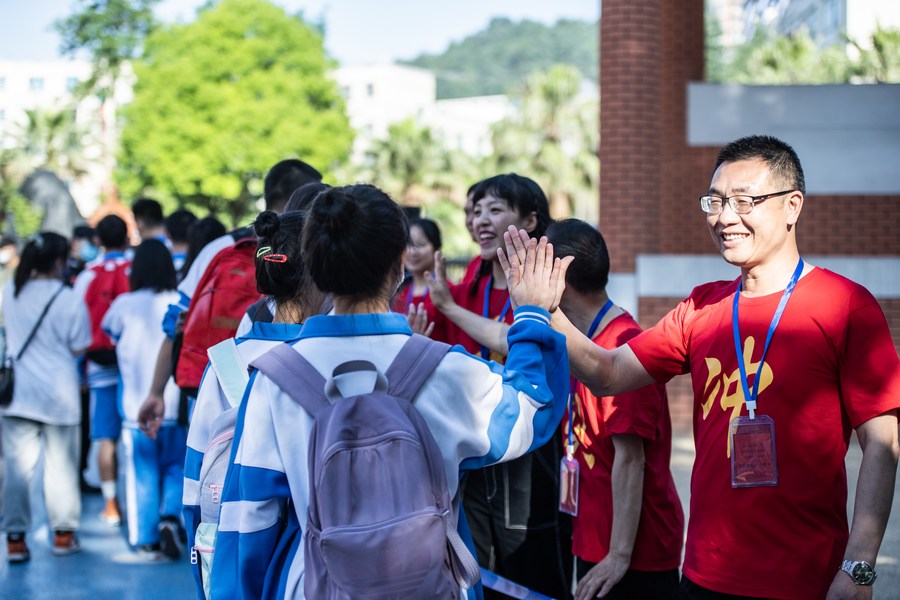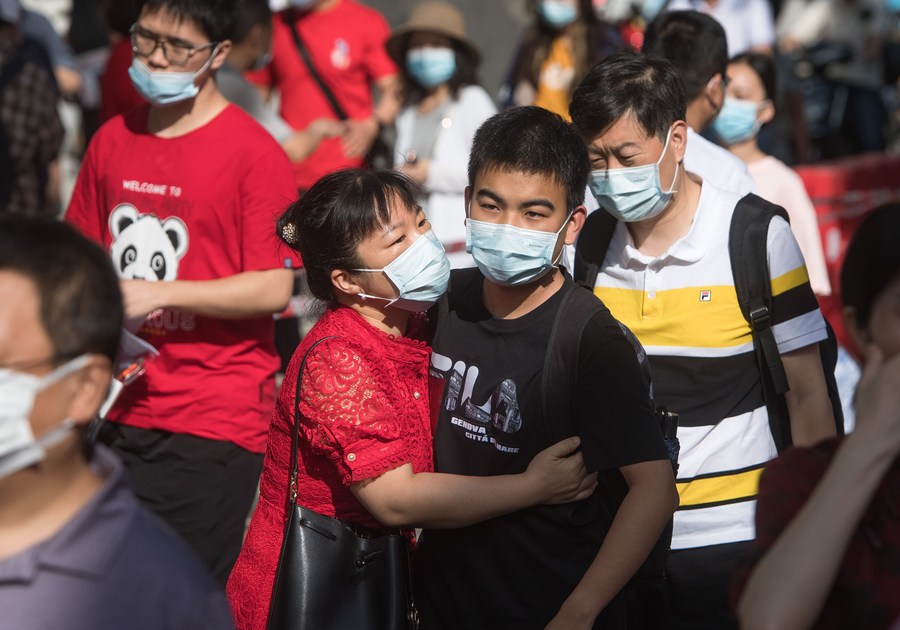
Teachers clap with examinees at an exam site of a high school in Guiyang City, southwest China's Guizhou Province, June 7, 2021. China's annual college entrance exam, better known as the Gaokao, kicked off Monday morning with a record 10.78 million candidates signing up for perhaps the world's most grueling test. (Xinhua/Tao Liang)
BEIJING, June 7 (Xinhua) -- Donning a red Qipao dress, Meng Qingmei waits anxiously in front of the Experimental High School attached to Beijing Normal University, where her daughter is taking China's annual college entrance exam that kicked off Monday morning.
Considered the world's most grueling test, the exam, better known as the Gaokao, saw a record 10.78 million candidates signing up this year.
"I purchased it (the dress) especially for today," Meng said. Qipao sounds similar to the Chinese phrase "qikaidesheng," meaning victory, while red is considered an auspicious color in Chinese culture symbolizing good fortune.
Meng's husband was also wearing a red T-shirt. "The COVID-19 situation in Beijing has been very stable this year, and following proper epidemic control measures has become our daily routine," said her husband. "So we are not worried."
Xue Mingyin, who was a Gaokao examinee last year, paid a visit to her alma mater on Monday to encourage her junior schoolmates. "The red gate and tents erected for temperature screening are the same, but the atmosphere is much more relaxed," she said.
This year's exam is also the biggest-ever collectively organized event since the coronavirus outbreak, witnessing millions of students in around 7,000 venues across the country. Last year the Gaokao had to be postponed by approximately a month due to the epidemic situation.
Local governments at various levels have customized epidemic control measures to ensure the safety of students and the smooth progress of the exam, which is still deemed a fate-changing opportunity for many.
A total of 51,738 students signed up for Gaokao in Beijing this year. They will take the exam in 1,566 exam halls across 90 venues.

Examinees wait outside an exam site at a high school in Guiyang City, southwest China's Guizhou Province, June 7, 2021. China's annual college entrance exam, better known as the Gaokao, kicked off Monday morning with a record 10.78 million candidates signing up for perhaps the world's most grueling test. (Xinhua/Tao Liang)
Beijing has made it mandatory for all frontline exam staff to be vaccinated, and a negative nucleic acid test within a week should be provided. Temperature screening, disinfection and ventilation are strictly implemented during the exam.
In the southern city of Guangzhou, where new cluster infections emerged recently, the test is being conducted under strict anti-epidemic measures.
More than 50,000 candidates and some 7,000 people related to the exam in Guangzhou had completed two rounds of nucleic acid testing as of Sunday, and all relevant staff members have been vaccinated.
The Guangzhou Eighth People's Hospital, where two senior high school students tested positive for COVID-19, has set up special rooms in the isolation ward for the students and installed high-definition surveillance cameras for real-time audio and video recording. The invigilators monitor the exam from a designated area.

A parent encourages an examinee at an exam site of Hubei Wuchang experimental high school in Wuhan, central China's Hubei Province, June 7, 2021. China's annual college entrance exam, better known as the Gaokao, kicked off Monday morning with a record 10.78 million candidates signing up for perhaps the world's most grueling test. (Xinhua/Xiao Yijiu)
In the Golog Tibetan Autonomous Prefecture, which was hit by a 7.4 magnitude earthquake in late May, a total of 891 candidates take the exam in tents as aftershocks are still active in the region.
Each tent measuring approximately 60 square meters in size can house 30 students, according to the prefecture's education bureau.
In east China's Jiangsu Province, where 9,952 exam halls were set up for about 359,000 students this year, 976 backup rooms have been reserved for the exam.
"Each backup room can only host one student. The invigilators will put on hazmat suits once the backup room is operational, and the papers will be disinfected using ultraviolet light for half an hour and sealed in a hermetic bag after the exam," said Gui Xingyuan, an official at an examination site in the provincial capital Nanjing.
Over 300 taxi drivers in the city of Wuxi have volunteered to shuttle candidates taking the Gaokao. The practice has been going on for 19 consecutive years, with the taxis serving more than 10,000 students.
In Shenyang, capital of northeast China's Liaoning Province, a total of 1,058 exam halls and 165 backup exam rooms have been set up to serve the examinees.
"Shenyang reported new COVID-19 infections about 20 days before the Gaokao, and the students were more or less affected. But we have taken proper measures and provided necessary counseling to help them relieve the pressure," said Shao Yingying, a teacher in Shenyang.
"The students went through a tough time last year with about half a year of schooling at home. But, I believe they will overcome the difficulties and do well in the exam," Shao said. ■




